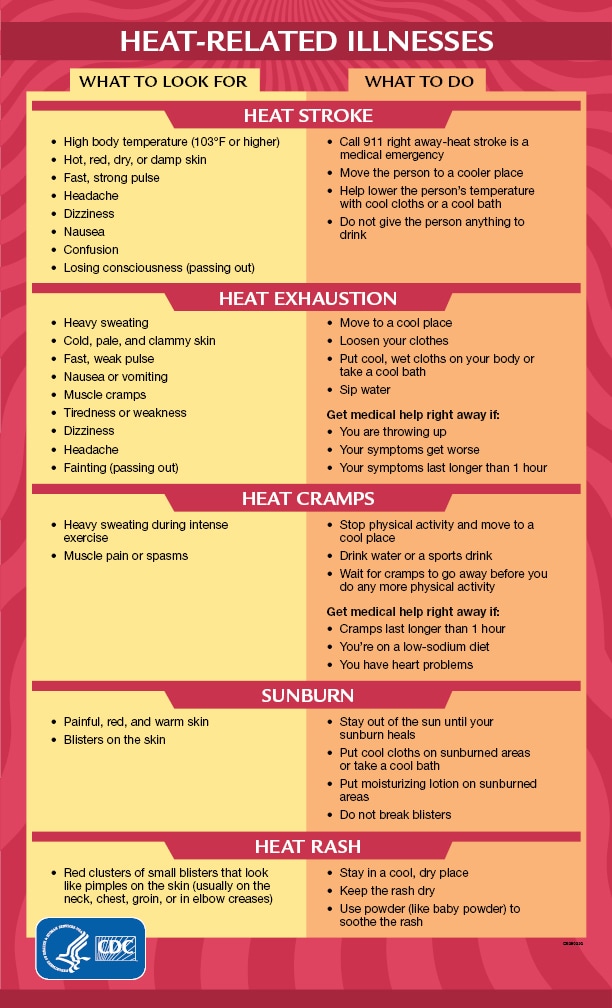Excessive Heat Warning in effect for Northwestern Washington till 7 p.m. Saturday

Extreme heat will significantly increase the potential for heat related illnesses, particularly for those working or participating in outdoor activities. Here's how to stay safe! (Photo: Creative Commons License)
The National Weather Service has issued an Excessive Heat Warning for Northwestern Washington through 7 p.m. on Saturday, August 14 with temperatures rising to nearly 100 degrees. Here are ways to stay cool, safe, and alert.
Cooling centers
The City of Seattle has a list of cooling centers and other resources around the city. All locations and hours of operation vary. Click here for more information.
Cooling centers throughout King County, including King County libraries, will also be available. Some sites will be closed on Sunday. For an updated list of cooling centers in King County, click here.
Take precautions
The Washington State Department of Health is urging people to take precautions to reduce the risk of heat exhaustion and heat stroke:
• Stay indoors and in an air-conditioned environment as much as possible unless you're sure your body has a high tolerance for heat.
• Drink plenty of fluids but avoid beverages that contain alcohol, caffeine or a lot of sugar.
• Eat more frequently but make sure meals are balanced and light.
• Never leave any person or pet in a parked vehicle.
• Avoid dressing babies in heavy clothing or wrapping them in warm blankets.
• Check frequently on people who are elderly, ill or may need help. If you might need help, arrange to have family, friends or neighbors check in with you at least twice a day throughout warm weather periods.
• Make sure pets have plenty of water.
• Salt tablets should only be taken if specified by your doctor. If you are on a salt-restrictive diet, check with a doctor before increasing salt intake. If you take prescription diuretics, antihistamines, mood-altering or antispasmodic drugs, check with a doctor about the effects of sun and heat exposure.
• Cover windows that receive morning or afternoon sun. Awnings or louvers can reduce the heat entering a house by as much as 80 percent.
If you go outside
• Plan strenuous outdoor activities for early or late in the day when temperatures are cooler; then gradually build up tolerance for warmer conditions.
• Take frequent breaks when working outdoors.
• Wear a wide-brimmed hat, sun block and light-colored, loose-fitting clothes when outdoors.
• At first signs of heat illness (dizziness, nausea, headaches, muscle cramps), move to a cooler location, rest for a few minutes and slowly drink a cool beverage. Seek medical attention immediately if you do not feel better.
• Avoid sunburn: it slows the skin's ability to cool itself. Use a sunscreen lotion with a high SPF (sun protection factor) rating.
• Avoid extreme temperature changes. A cool shower immediately after coming in from hot temperatures can result in hypothermia, particularly for elderly or very young people.
If the power goes out or air conditioning is not available
• If air conditioning is not available, stay on the lowest floor out of the sunshine.
• Ask your doctor about any prescription medicine you keep refrigerated. (If the power goes out, most medicine will be fine to leave in a closed refrigerator for at least 3 hours.)
• Keep a few bottles of water in your freezer; if the power goes out, move them to your refrigerator and keep the doors shut.
Hot Weather Safety information in other languages:
Heat-related illness
Heat-related illnesses are preventable. Learn the symptoms and what to do if you or a loved one shows signs of having a heat-related illness. From the Center for Disease Control and Prevention:

